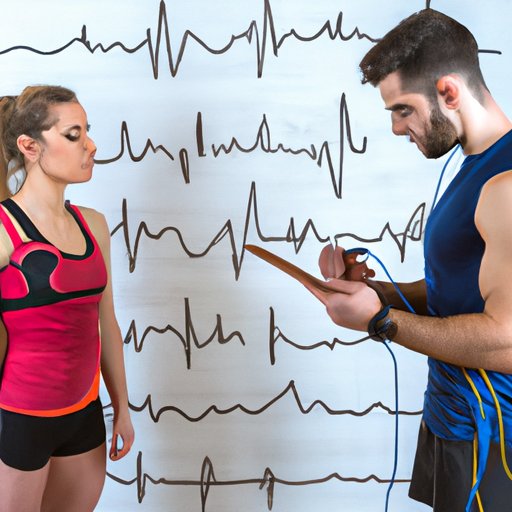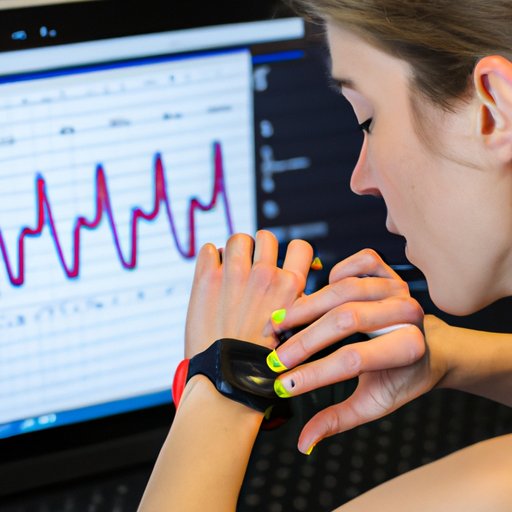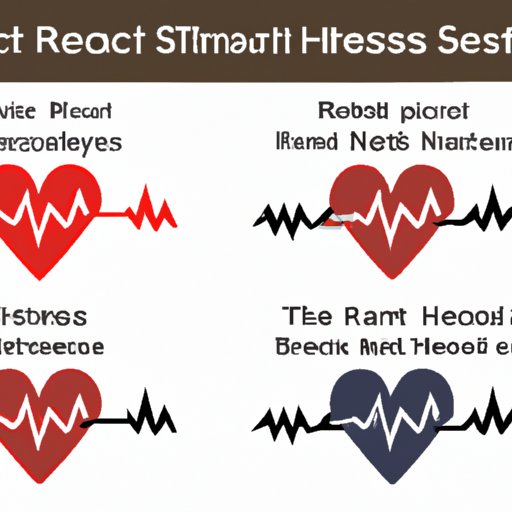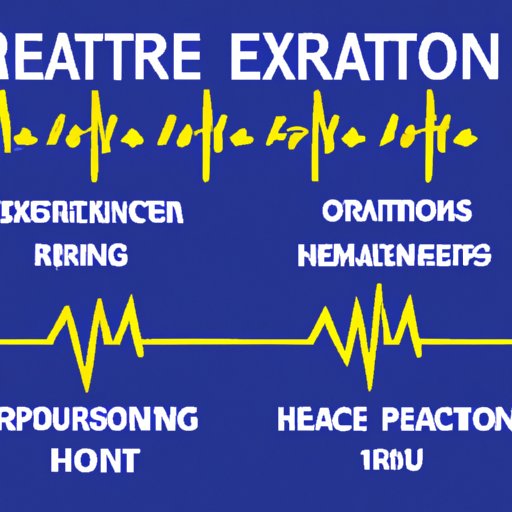Introduction
When you exercise, your heart rate increases. This is known as exercise-induced heart rate increase. It is a natural response to physical activity and is beneficial for your overall health and fitness.
In this article, we will explore why your heart rate increases when you exercise. We will look at the physiological benefits of exercise-induced heart rate increase and examine how the cardiovascular system responds during exercise. We will also analyze the role of neurotransmitters in regulating heart rate during exercise and how exercise impacts blood pressure and heart rate. Finally, we will discuss the link between stress and elevated heart rate during exercise and the relationship between oxygen consumption and heart rate increase.
Exploring the Physiological Benefits of Exercise-Induced Heart Rate Increase
Exercise-induced heart rate increase comes with a variety of physiological benefits. These include improved cardiovascular system functioning, increased oxygen and nutrient delivery to muscles, and enhanced metabolism.
Improved cardiovascular system functioning: Regular exercise helps strengthen the heart muscle and improves its pumping ability, which leads to better circulation throughout the body. As a result, the cardiovascular system is able to function more efficiently, leading to improved overall health.
Increased oxygen and nutrient delivery to muscles: During exercise, the heart pumps more blood throughout the body, increasing the amount of oxygen and nutrients delivered to the muscles. This helps improve muscular endurance and performance.
Enhanced metabolism: Exercise can help boost your metabolic rate, which is the rate at which your body burns calories. This can help you lose weight and maintain a healthy body composition.

Examining the Cardiovascular System During Exercise and Its Effect on Heart Rate
Your cardiovascular system plays a key role in regulating your heart rate during exercise. The autonomic nervous system is responsible for controlling the heart rate and other involuntary functions of the body. When you begin exercising, the autonomic nervous system sends signals to the heart to increase its rate of contraction and increase the speed of blood flow throughout the body.
The heart then responds by increasing its rate of contraction, which leads to an increase in the heart rate. This increase in the heart rate helps to meet the body’s increased demand for oxygen and nutrients during physical activity.
The relationship between blood pressure and heart rate during exercise is also important to understand. When you start exercising, your blood pressure drops slightly due to the increased demand for oxygen and nutrients. This drop in blood pressure causes the heart rate to increase.

Analyzing the Role of Neurotransmitters in Regulating Heart Rate During Exercise
Neurotransmitters play an important role in regulating heart rate during exercise. Adrenaline is released during physical activity and it stimulates the heart to beat faster. Endorphins are also released during physical activity and they help reduce pain and improve mood. Serotonin is another neurotransmitter that is released during exercise and it helps regulate the heart rate.
The impact of adrenaline: Adrenaline is released during exercise and it stimulates the heart to beat faster in order to meet the increased demand for oxygen and nutrients. This helps the body to perform at a higher level and increases endurance.
The effects of endorphins: Endorphins are released during exercise and they help reduce pain and improve mood. They also act as a natural stress reliever, which helps to reduce anxiety and improve overall mental health.
The role of serotonin: Serotonin is a neurotransmitter that is released during exercise and it helps to regulate the heart rate. It also helps to regulate mood and sleep patterns, which can have a positive effect on overall health and wellbeing.
How Does Exercise Impact Blood Pressure and Heart Rate?
Exercise can have both short term and long term effects on blood pressure and heart rate. In the short term, exercise can cause a slight decrease in blood pressure, which can lead to an increase in heart rate. In the long term, regular exercise can help to lower blood pressure and reduce the risk of heart disease and stroke.
The link between blood pressure and heart rate: Blood pressure and heart rate are closely linked. When blood pressure drops, the heart rate increases in order to meet the body’s increased demand for oxygen and nutrients. Conversely, when blood pressure rises, the heart rate decreases in order to reduce the workload on the heart.

The Link Between Stress and Elevated Heart Rate During Exercise
Stress can play a major role in regulating heart rate during exercise. When you are feeling stressed, your body releases hormones such as cortisol and adrenaline, which can lead to an increase in heart rate. It is important to manage stress levels in order to reduce heart rate during exercise.
Understanding the stress response: The stress response is a natural reaction to a perceived threat. When you feel threatened, your body releases hormones such as cortisol and adrenaline, which can lead to an increase in heart rate. It is important to manage stress levels in order to reduce heart rate during exercise.
Examining the effects of stress on blood pressure and heart rate: Stress can have a significant impact on blood pressure and heart rate. When you are feeling stressed, your blood pressure may rise, which can lead to an increase in heart rate. It is important to manage stress levels in order to reduce heart rate during exercise.
How to manage stress to reduce heart rate during exercise: There are a few different ways to manage stress in order to reduce heart rate during exercise. These include deep breathing exercises, meditation, yoga, and aerobic exercise. All of these activities can help to reduce stress levels and lower heart rate during exercise.
Understanding the Relationship Between Oxygen Consumption and Heart Rate Increase During Exercise
Oxygen plays an important role in regulating heart rate during exercise. When you begin exercising, your body needs more oxygen in order to meet the increased demand for energy. This leads to an increase in oxygen consumption, which can lead to an increase in heart rate.
The role of oxygen in exercise: Oxygen is essential for the body to produce energy. During exercise, the body needs more oxygen in order to meet the increased demand for energy. This leads to an increase in oxygen consumption, which can lead to an increase in heart rate.
How the body uses oxygen during exercise: During exercise, the body breaks down glucose and fatty acids in order to produce energy. This process requires oxygen, which is supplied to the body through the bloodstream. When the body needs more oxygen, the heart rate increases in order to supply more oxygen to the muscles.
The relationship between oxygen consumption and heart rate increase: The relationship between oxygen consumption and heart rate increase is important to understand. When the body needs more oxygen, the heart rate increases in order to supply more oxygen to the muscles. This helps the body to perform at a higher level and increases endurance.
Conclusion
Exercise-induced heart rate increase is a natural response to physical activity and is beneficial for your overall health and fitness. It helps to improve cardiovascular system functioning, increase oxygen and nutrient delivery to muscles, and enhance metabolism. The autonomic nervous system, neurotransmitters, and oxygen consumption all play a role in regulating heart rate during exercise. Additionally, stress can have a significant impact on blood pressure and heart rate. Managing stress levels can help to reduce heart rate during exercise.
In summary, understanding why your heart rate increases when you exercise is important for maintaining good health and fitness. Regular exercise can help to improve cardiovascular system functioning, increase oxygen and nutrient delivery to muscles, and enhance metabolism. It can also help to reduce stress levels and lower heart rate during exercise.
(Note: Is this article not meeting your expectations? Do you have knowledge or insights to share? Unlock new opportunities and expand your reach by joining our authors team. Click Registration to join us and share your expertise with our readers.)
